London Urges Uganda To Retract Anti-Gay Laws
Hundreds of Londoners urged an East African country to repeal the anti-gay, which was recently signed by President Yoweri Museveni.
The gays activists called on the leadership in Uganda to consider fighting poverty, corruption, malaria and HIV/AIDS instead of persecuting the LGBTs in the country. The activists say that the new draconian law is associated with homophobic characters and its unconstitutional.
To the beat of African drummers and dancers, Ugandan LGBTs and their allies assembled outside the 58-59 Trafalgar Square, the London-based Uganda Mission on March 19, protesting against the new draconian Anti-Homosexuality Act - one of the world's harshest anti-gay laws.
The controversial legislation has attracted international condemnation and provoked Aid cut to Uganda. Barely, days after Museveni appended his signature to the controversial law; Sweden, Norway, Denmark and the Netherlands declared their intentions publically to cut aid money to Uganda.
Netherlands stopped about 7 million Euros (approximately £6 million) in aid money that was supposed to the Uganda legal system, as the Dutch expressed their unwillingness to aid and abet the persecution of the LGBT people.
Sweden cut 6.5 millions Swedish Krona (approximately £600,000) to Uganda's government protesting the signing of the Anti-Homosexuality Act into law; whilst the World Bank suspended $90 million (£50.78 million) towards Uganda health sector.
Last year [2013], Sweden aid to Uganda came to about 225 million kronor (approximately £20 million).
A week ago; the European Parliament (EU) proposed a motion to slap sanctions on two African countries Uganda and Nigeria in disapproval of the lately passed and what widely considered to be the world's greatest draconian Anti-Gay legislations. Members of European Parliament (MEPs) agreed a non-binding resolution by a large majority that bot countries violated the Cotonou accord on human rights, democratic principles and the rule of law. The resolution issued last week by the EU Parliament resolution; suggested sanctions such as travel and visa bans against 'the key individuals responsible for drafting and adopting' the laws in Nigeria and Uganda respectively.
The anti-gay law in Uganda; calls for "repeat homosexuals" to be jailed for life, outlaws any promotion of homosexuality and requires people to report homosexuals. Whilst; In Nigerian President Goodluck Jonathan signed a law that slaps 14-year prison sentences on homosexuals. According to Amnesty International, since it was signed in January, scores of gay men have been arrested or beaten by mobs.
Here in London, among those in the Wednesday crowd was Bernard Randall, who faced charges in Uganda last year and whose friend Albert Cheptoyek still faces trial.
The protest was jointly organised by the African LGBTI Out & Proud Diamond Group and Peter Tatchell Foundation, with the support of activists from Nigeria, the RMT union, Amnesty International and the NAZ Project.
'President Museveni should fight poverty, corruption, malaria and HIV - not gays. He should build schools and clinics - not create hatred. Homosexuality is African; homophobia isn't. It was a colonial import to Uganda. We are urging the repeal of all Uganda's anti-gay laws - both the new legislation and the old nineteenth century colonial-era criminalisation of homosexuality. I urge the international community to continue funding aid projects in Uganda via organisations that don't discriminate - and to work with the Ugandan people towards achieving equality for all,' said Edwin Sesange, Director African LGBTI Out and Proud Diamond Group.
Peter Tatchell, Director of the human rights organisation, the Peter Tatchell Foundation, added:
'The Anti-Homosexuality Act law violates Article 21 of the Ugandan constitution, the Commonwealth Charter and the African Charter on Human & People's Rights, to which Uganda is a signatory. It does not even conform to the human rights check list agreed by Ugandan parliamentarians. The law was passed by the parliament without a quorum. When he signed the law, the president justified his decision by distorting the scientific evidence about homosexuality.
'The new legislation extends the current maximum penalty of life imprisonment for anal intercourse to a mandatory life sentence for any same-sex act, even mere kissing and touching with homosexual intent. Attempts to commit any form homosexual contact carry an automatic seven year jail term.
'The legislation also introduces maximum sentences of five to seven years imprisonment for aiding, abetting, counselling or promoting homosexuality, including advocating LGBT rights and funding or assisting LGBT people or events. In addition, there is a compulsory life sentence for anyone who has a same-sex marriage and a maximum penalty of seven years for a person who conducts such a marriage.
'The Anti-Homosexuality Act is part of a wider attack on civil society, including the harassment of opposition activists, detention without trial, torture, extra-judicial killings, restrictions on the media and the suppression of protests and strikes. LGBT and straight Ugandans have a common interest in defending democracy and human rights. We stand with them in solidarity,' added Mr Tatchell.
The protest urged:
President Yoweri Museveni and the Ugandan parliament to repeal all anti-gay laws.
The Ugandan media to stop the anti-gay witch-hunts that fuel homophobic hate crimes.
Ugandan religious and cultural leaders to speak out for LGBTI human rights.
The President to uphold all the human rights enshrined in the Ugandan constitution.
Richard Banadda, coordinator of the protest, said:'The signing of the Anti-Homosexuality Act is one aspect of an increased crackdown on the civil liberties of the Ugandan people, including the public order law, the anti-pornography law and the scrapping of bail for LGBTI people.'
'There are already many laws in Uganda against sexual abuse, to protect children and other vulnerable people. This law is an unnecessary duplication of the existing laws,' said Mr Banadda, adding: 'The Ugandan government should work towards building partnerships with other countries that respect human rights, instead of isolating itself with laws that violate international humanitarian statutes.
Mr Banadda further explained that: 'This law is scaring away foreign investors, expatriates, tourists and aid donors. It also diverts attention from the main problems affecting Uganda, such as poverty and under-resourced medical and educational facilities.'
'The prejudiced language the President has used about LGBTI people has re-enforced and stirred negative, homophobic opinions,' said Mr Banadda.
Additionally, George Dhabangi, a trustee of African LGBTI Out and Proud Diamond Group, added: 'This law is a blackmailer's charter. It is likely to be used against political opponents, as recently happened in Malaysia where the opposition leader was prosecuted on charges of homosexuality. I call upon all Ugandans to challenge this law.'
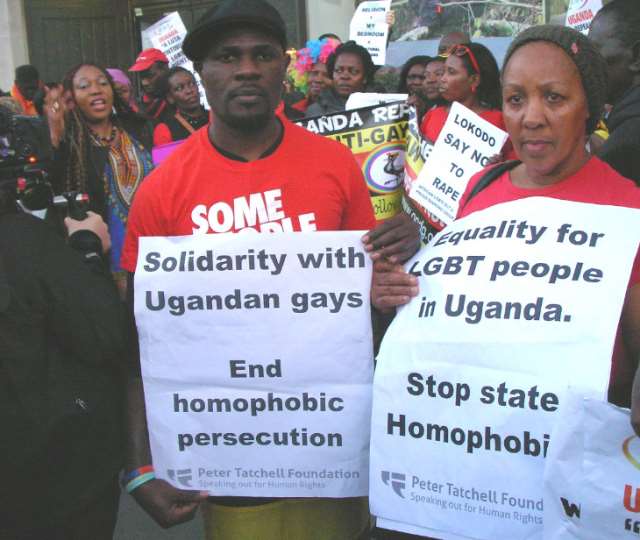
2014-03-21 103745
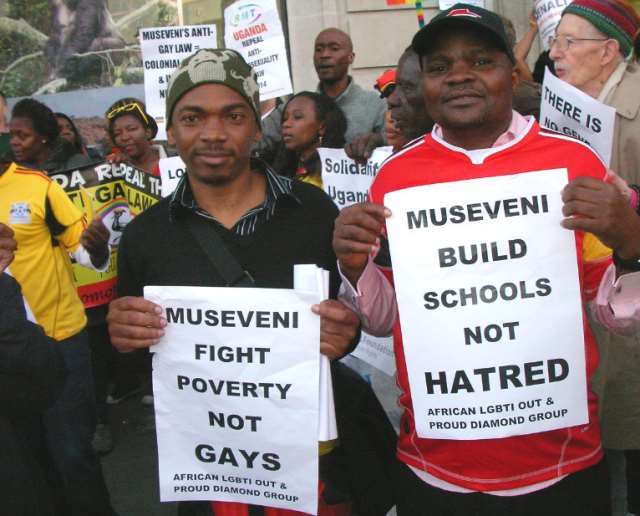
2014-03-21 103810
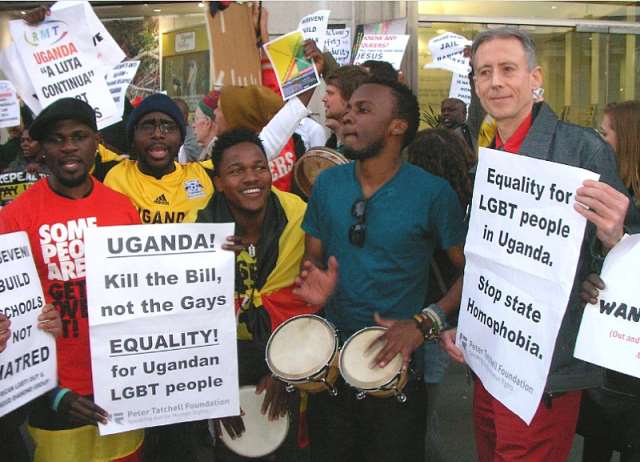
2014-03-21 103826
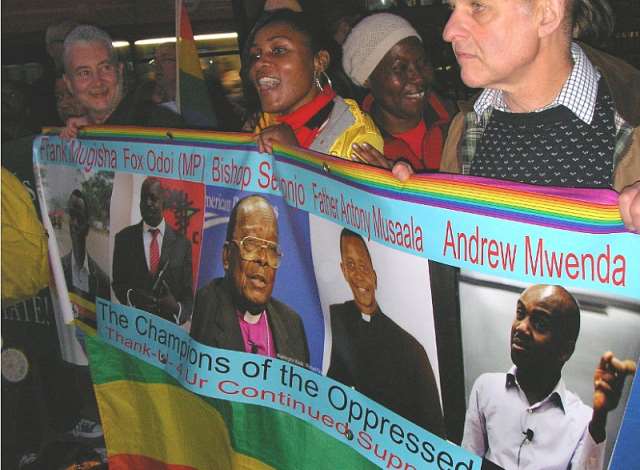
2014-03-21 103846
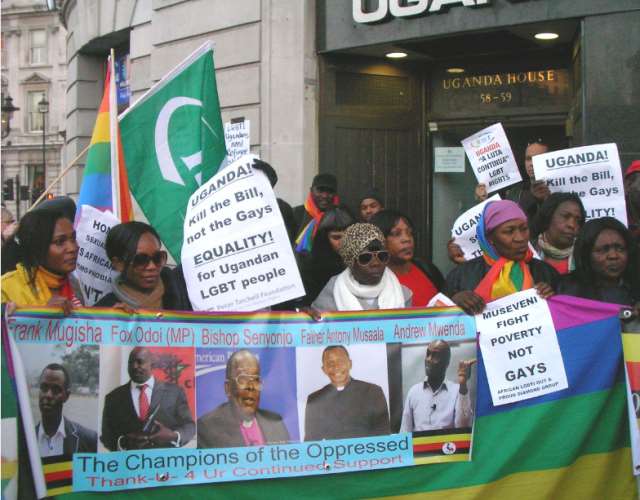
2014-03-21 103906
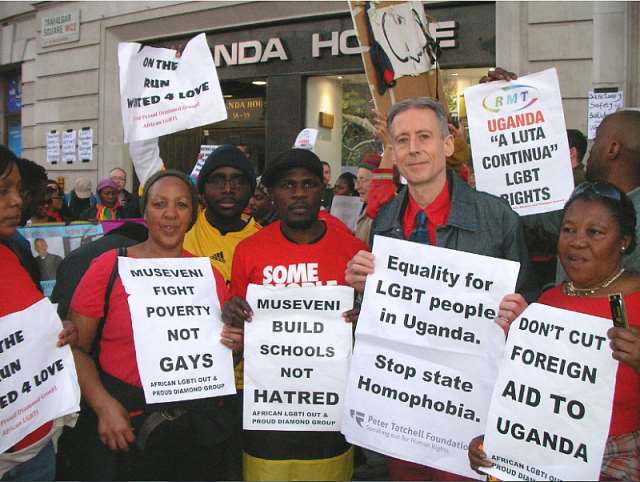
2014-03-21 103921
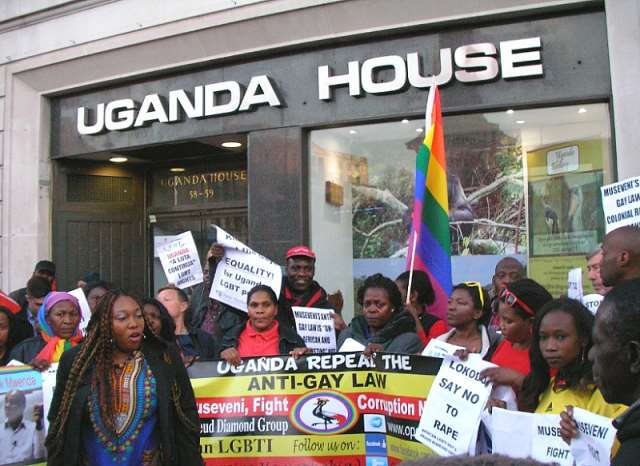
2014-03-21 103936
